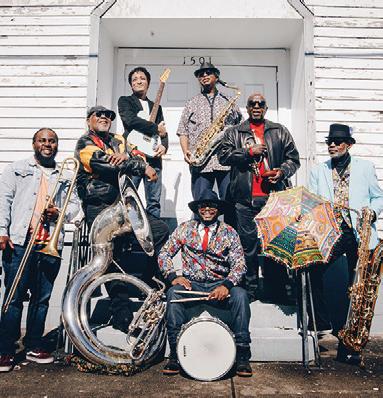
2 minute read
I Think I Like My Natural Hair
Sharing Our Stories
By: W.D. Foster-Graham Book
Advertisement

Editor
Review
I Think I Like My Natural Hair
Stephanie Shider


By
Growing up and well into my adult years, I heard the references made by African Americans about having “good hair” (long and straight) vs. “bad hair” (natural). The older I got, the more I viewed this attitude as a product of internalized racism.
Stephanie Shider’s book I Think
I Like My Natural Hair gives us a deeper insight into what this mindset represents, especially for Black women.
As a darkcomplexioned Black woman, Shider was exposed to the belief that beauty adhered to Eurocentric standards during her childhood; anything else was less than. Her sense of “pretty” wasn’t a big deal to her—until was challenged by her classmates in a cruel way.
Sadly, this belief that light skin and long straight hair as the ideal persists today, bolstered by the images presented through the various media avenues. Shider takes this ongoing issue regarding a Black woman’s natural hair back to its history in slavery, when the slave masters did everything they
Secretary for Occupational Safety and Health Doug Parker.
“Workers in the U.S. need to feel empowered and able to trust could to disenfranchise us of our African heritage and ancestors, creating an environment of oppression, division, identity crises, self-hate, and low selfesteem. She reminds us of the importance of having a strong family narrative, of knowing where we came from. When we as elders continually share our stories of family history,



OSHA and the U.S. Department of Labor enough to voice their concerns about workplace safety regardless of their immigration status and fears of retaliation.”

“By enabling OSHA to issue U and T visa certifications, we will be empowering some of our economy’s most vulnerable workers to tell us it empowers our children and instills a confidence in who they are, and whose they are. The incidence of Black men who are incarcerated carrying this loss of identity cannot be overstated. Shider states the imperative of loving ourselves for who we are, for only then can we see our beauty within and love and affirm others.






During her spiritual if their jobs are jeopardizing their safety and health, and that of their co-workers, and to support our enforcement efforts,” Parker added. The initiative announced today aligns with the department’s Diversity, Equity, Inclusion and Accessibility plan and the journey, the deeper issues of character vs. the shallow, worldly issues of looks deepened her knowledge, wisdom and self-esteem as she sought out what God called her to be. She illustrates well the examples of conformity (the Pharisees) vs. transformation (Jesus) as it relates to where we are in the present day. At the end of the day, it is God the Creator


Biden-Harris administration’s effort to advance racial equity and support who knows us and loves us for who we are, and we can stop comparing ourselves to others or to a limited standard of beauty.

I Think I Like My Natural Hair is available through Amazon, Barnes and Noble, and the Minnesota Black Authors Expo website.
Thank you, Stephanie, for sharing the bigger picture and the powerful way you encourage us to love ourselves and embrace all of who we are. After all, God doesn’t make mistakes. And yes, as a brotha of a certain age, I like what’s left of my natural hair.
“The kind of beauty that I want the most is the hardto-get kind that comes from within—strength, courage, dignity.” (Ruby Davis)






